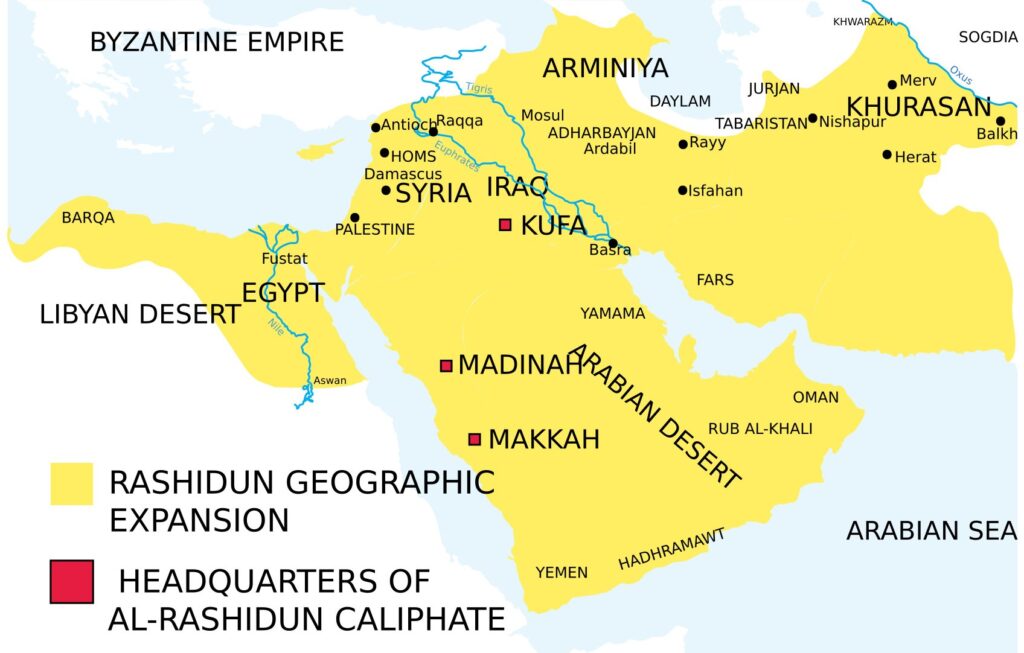The Rise Of Islam
In the year 610 AD, on a quiet night in the mountains near Mecca, a profound moment in history unfolded. The Prophet Muhammad, alone in the cave of Al-Hira, was visited by the Angel Gabriel, who brought with him a command that would forever change the course of the world: “Read in the Name of Your Lord.” These first words of the Quran sparked a revelation that would continue for the next 23 years, shaping the lives of millions and creating a faith that would stretch across continents.
Muhammad, born in 570 AD into the noble Banu Hashem tribe of the Quraysh, had always been known for his wisdom and integrity. But now, he would become the messenger of a new divine message. His followers, initially few, would come to memorize the Quranic verses as they were revealed to him, preserving the words of God in their hearts. The beauty of the Arabic language, so expertly woven into the revelations, became the foundation for a language of faith, devotion, and unity.

However, the road ahead would not be easy. By 622 AD, the growing community of Muslims in Mecca faced persecution from the Quraysh rulers. The Prophet and his followers sought refuge in the city of Madinah, to the north. This migration, known as the Hijra, became so significant that it marked the beginning of the Islamic calendar. It was here, in Madinah, that the first mosque was built, and the practice of daily prayers, fasting during Ramadan, and the pilgrimage to Mecca became integral to Muslim life. Madinah would become the heart of a rapidly growing faith, and the Prophet’s leadership would lay the groundwork for a new political and spiritual order.
al-Khulafaa al-Rashidun
When Prophet Muhammad passed away in 632 AD, the future of the Muslim community was in the hands of his closest companions. The al-Khulafaa al-Rashidun—the “Rightly Guided” Caliphs—were chosen to lead not by family ties, but through consultation (shura), based on their wisdom, leadership, and loyalty to the faith. Abu Bakr, the first caliph, took charge at a time of uncertainty, uniting the tribes of Arabia under the banner of Islam. His leadership ensured that the teachings of the Prophet would not be lost, but spread far and wide.
Next came Umar, the second caliph, whose military prowess and organizational skills expanded the reach of Islam beyond Arabia, as the Muslim army defeated the mighty Byzantine and Sassanian empires. Under his rule, the caliphate grew into a vast empire, stretching across the Middle East, and the foundations for an Islamic civilization were laid. Then, Uthman, the third caliph, codified the Quran, ensuring that the holy text would remain unchanged for generations to come. His reign also saw the spread of Islam’s influence into new lands, though tensions were beginning to stir within the growing community

The final caliph of the Rashidun period, Ali, faced the challenge of holding the rapidly expanding empire together amidst internal strife. As the Prophet’s cousin and son-in-law, Ali was deeply revered, but his leadership was contested. In 661 AD, after years of turmoil and conflict, Ali’s death marked the end of the Rashidun era and the beginning of a new chapter in Islamic history.
The Beginning of the Dynastic Rule
It was during this time that the Umayyad dynasty, led by Muawiya bin Abi Sufyan, rose to power. Muawiya, who had been a prominent figure during the caliphate of Uthman and Ali, established the first hereditary caliphate in Islamic history, moving the capital to Damascus. His reign marked a shift from the ideal of shura to dynastic rule, setting the stage for the political divide that would eventually lead to the birth of the Shiite faction. The Shiites believed that leadership should remain within the Prophet’s family, especially through Ali and his descendants, while the Sunni majority supported the more expansive concept of leadership by consensus.
As the Umayyads solidified their power, the legacy of the Prophet Muhammad and his companions continued to shape the future of Islam. The faith, born in the deserts of Arabia, would soon spread across vast regions, from Spain to India, and influence civilizations for centuries to come. The journey of the early Muslims, from the cave of Al-Hira to the rise of powerful empires, is a story of faith, perseverance, and unity that would change the world forever.